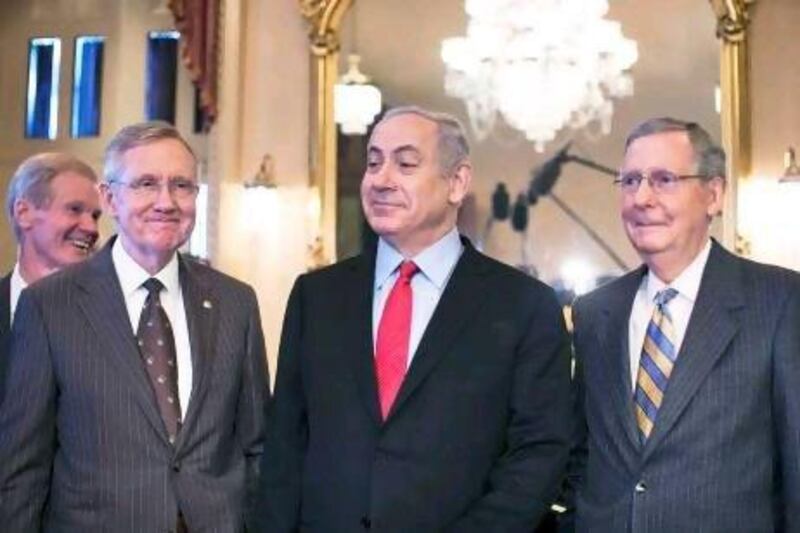TEL AVIV // The US and Israel remain deeply divided over their approach to Iran's nuclear ambitions after a much-anticipated White House meeting between the two countries' leaders, analysts said yesterday.
But even as Barack Obama, the US president, and Benjamin Netanyahu, the Israeli prime minister, tried to iron out their differences on how urgently and whether a military strike might be needed against Iran, they appeared to have tacitly agreed to shelve the Israeli-Palestinian peace track for now.
Iran dominated talks between the two leaders in Washington on Monday.
Palestinian leaders yesterday expressed anger at Mr Obama for barely making a passing reference to the peace talks before meeting Mr Netanyahu and during his speech to the pro-Israel lobby American Israel Public Affairs Committee, or Aipac.
In unusually sharp comments about the US president, Hanan Ashrawi, a senior official in the Palestine Liberation Organisation, the umbrella group that includes most Palestinian factions, told journalists in Ramallah that Mr Obama's words were "very clearly an election speech, to win votes and influence people in the US and Israel".
Referring to Mr Obama's insistence during his Aipac speech that he has often looked out for Israel's interests as president, she said the Palestinians could not believe that the US president "is out there" trying to prove he is good for Israel.
"This is the president of the most powerful country. Do you have your own foreign policy?" she asked.
The Palestinian criticism of Washington seems to reflect frustration that little progress has been made towards an independent Palestinian state.
Negotiations have been deadlocked since September 2010.
Analysts say the main motive for Mr Obama to lay off pressure on Israel to advance towards a peace pact by curtailing settlement activities is the president's aspiration for re-election in November's ballot.
"Obama needs the pro-Israel vote and the pro-Israel money," said Yossi Alpher, an Israeli political analyst. "Netanyahu can now build neighbourhoods in [mostly Palestinian] east Jerusalem and barely get a slap on the wrist."
With the Israeli-Palestinian conflict on the back-burner, the suspect Iranian nuclear programme was the dominant issue during Mr Netanyahu's visit in Washington this week.
Publicly, the two men have demonstrated a united front against Iran
The Israeli premier made it clear he viewed Iran's nuclear programme as an imminent threat and that he may not wait for America's green light to launch a strike.
On Monday, he told Mr Obama in an on-camera statement that Israel must be "master of its fate".
In an evening speech to Aipac, he said "none of us can afford to wait much longer."
Still, Israeli officials said Mr Netanyahu told the US president he has not yet reached a decision on an attack.
"Obama wants to buy more time until after the November elections, and may have given Netanyahu some assurances, such as a possible US military strike on Iran should Tehran weaponise," said Yoel Guzansky, a former Israeli government official who helped coordinate the government's approach to Iran from 2005 to 2009.
Mr Guzansky, a researcher at The Institute for National Security Studies at Tel Aviv University, said Mr Obama tried to sound tougher on Iran than before to narrow the gap - at least publicly - with Mr Netanyahu.
Analysts said the Israeli premier may soften his approach on the military option should he assess that Mr Obama is the frontrunner in the US election campaign.
Iran has become one of the main topics in the campaign and Mr Obama has been attacked by Republican candidates vying for the Jewish vote as not being tough enough on Tehran's nuclear ambitions.
"Mr Netanyahu figures he will have an easier time on the Iranian and Palestinian issue with a Republican administration," said Mr Alpher.
[ foreign.desk@thenational.ae ]
* With additional reporting by Hugh Naylor in Jerusalem





